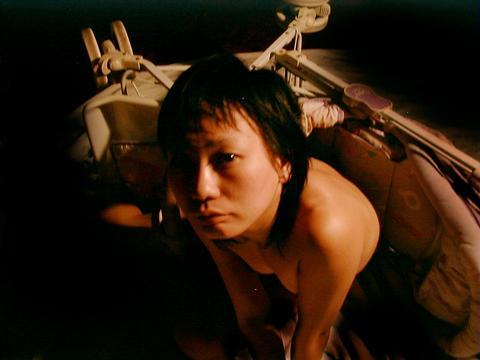Paris, summer 1971. A spotlight illuminates a crudely made-up king and queen sitting in a theater box. The audience turns to regard them. One of them eventually speaks. "Ladies and gentle ...(long pause) ... men! (Two minute pause). Deafman ... (even longer pause) ... glance!" And the house lights go down.
It was the opening of one of the strangest, and now one of the most historic, theater shows of an era that was full of surprises. The performers were some 20 New Yorkers, mostly students, plus another 15 or so French, similarly young, and an Englishman. The show, Deafman Glance, was the creation of a 30-year-old artist and former architecture student, Robert Wilson, and this was his fledgling company's first trip outside the US.

PHOTO COURTESY OF RIVERBED THEATRE
After a shaky start, the production proved a sensation among France's aesthetes and intelligentsia, with aged Surrealists driving up to Paris from remote villages to see it, and brawls at the box-office for tickets. After five weeks it closed, and Wilson went on to become one of the most celebrated theater artists of the modern era.

PHOTOS COURTESY OF RIVERBED THEATRE
The Englishman, as it happens, was me. I had wandered into the production as a roving reporter just at a time when they needed extra bodies. I ended up as a naked corpse partly covered in flowers, and was told that if I had to move it should be, like virtually everything else in the show, in glacial slow-motion.
In Taipei this week, Craig Quintero and his Riverbed Theatre are staging a show titled Life and Times of Robert Wilson at the National Theater's Experimental Theater from Thursday to Sunday based to some extent on Deafman Glance and the play's successors. Later in his career Wilson created several productions "about" famous 20th-century figures, and in his show, Quintero aims to turn the same kind of spotlight onto their creator.

PHOTOS COURTESY OF RIVERBED THEATRE
Like Wilson's own creations, this one will in no way seek to tell a story. Instead, it will evoke a style. Many of Wilson's trademark techniques -- pictorial images on a traditional proscenium-arch stage, side lighting, the performers as living sculptures -- will be incorporated, and some actual scenes from Deafman Glance will be re-created.
Talking to Craig Quintero is quite an experience. He has details of Wilson's work at his fingertips, and at the same time a strong sense of perspective about Wilson's oeuvre. While agreeing on the immense, though not uncontroversial, influence Wilson has had on theater, he feels that his classic shows were probably the early ones.
Today Wilson, while continuing to create productions using his now well-established style, is perhaps going through the motions, with the former human element largely missing. Quintero very much hopes this will be well and truly back in place in his own show.
The human was very much at the center of Deafman Glance. The entire production was a species of real-life ritual surrounding a teenage deaf-mute African-American boy named Raymond. Wilson had been told that, when very young, this boy could, in fact, hear and speak, but had lost the capacity as a result of a traumatic experience. By re-enacting events that might parallel this experience, in the presence of the on-stage Raymond, was it just possible that he would recognize something deep in his repressed memory, and there and then, on stage, regain the power of speech?
It was an extraordinary premise. But in that intoxicating era when altered states of consciousness were at the cutting edge of all the arts, just about anything was possible. Similarly, theater as magic and theater as rite were things whose time had come.
The paradox was, however, that this real-life human drama at the center of the stage drama was in strong contrast to the austerity and aesthetic purity of Wilson's general style.
As far as anyone knows, Raymond never regained his lost capacities. Wilson's style, however, has flourished, and voyaged on little-changed.
Magical transformations have a very long history in the theater, stretching back to its origins in temple dance-dramas, both in Asia and in Europe. In re-instituting the possibility of an actual transformation, Wilson was merely, albeit sensationally, taking theater back in the direction of its roots.
Taipei's Experimental Theater was deliberately designed to avoid the imposition of a proscenium arch on productions. Paradoxically, therefore, Riverbed has had to create one -- a box 10m wide, 5m deep and 5m high, with, if not actually a rising curtain, then at least the suggestion of a drawn-back one. Out of a cast of 18, six will embody Robert Wilson, in his trademark jeans and turtle-neck sweater, plus masks characterizing the man.
The music is the creation of the director's mother, Cheryl Quintero, featuring, among other things, the choir of her local church in Montana, a piano and a barber-shop quartet.
For a decade after Deafman, Wilson worked with composer Philip Glass, but subsequently, in shows such as The Civil Wars, he habitually used spirituals and other traditional African-American religious music. This aspect of Wilson's work will strongly influence the music this week, Quintero says.
And because Deafman Glance is now 34 years old, the characters' costumes will have the appearance of things taken out of a dusty cupboard, but brought back to life by the mysterious transforming power of theater.
Quintero is used to creating well-informed shows about some of his more spectacular theatrical predecessors. Last year Riverbed offered a show, The Futurist Cookbook, based on the concepts and practices of Filippo Tommaso Marinetti, the eccentric founder of futurism, in which audiences were invited to consume items created according to a cookbook that doesn't appear in many Taipei kitchens.
Life and Times of Robert Wilson will not attempt to ape Wilson's work. Instead, it will utilize elements of his manner, using pastiche and collage, to critique his creations. It will be a dialogue with Wilson, Quintero says. The hour-long performances promise to be extremely fascinating.
Riverbed Theatre's Life and Times of Robert Wilson plays at the Experimental Theater, Taipei from Thursday to Sunday at 7:30pm, with matinees on Saturday and Sunday at 2:30pm. Call (02) 3393 9888 for more information.

Taiwan has next to no political engagement in Myanmar, either with the ruling military junta nor the dozens of armed groups who’ve in the last five years taken over around two-thirds of the nation’s territory in a sprawling, patchwork civil war. But early last month, the leader of one relatively minor Burmese revolutionary faction, General Nerdah Bomya, who is also an alleged war criminal, made a low key visit to Taipei, where he met with a member of President William Lai’s (賴清德) staff, a retired Taiwanese military official and several academics. “I feel like Taiwan is a good example of

March 2 to March 8 Gunfire rang out along the shore of the frontline island of Lieyu (烈嶼) on a foggy afternoon on March 7, 1987. By the time it was over, about 20 unarmed Vietnamese refugees — men, women, elderly and children — were dead. They were hastily buried, followed by decades of silence. Months later, opposition politicians and journalists tried to uncover what had happened, but conflicting accounts only deepened the confusion. One version suggested that government troops had mistakenly killed their own operatives attempting to return home from Vietnam. The military maintained that the

Taipei Mayor Chiang Wan-an (蔣萬安) announced last week a city policy to get businesses to reduce working hours to seven hours per day for employees with children 12 and under at home. The city promised to subsidize 80 percent of the employees’ wage loss. Taipei can do this, since the Celestial Dragon Kingdom (天龍國), as it is sardonically known to the denizens of Taiwan’s less fortunate regions, has an outsize grip on the government budget. Like most subsidies, this will likely have little effect on Taiwan’s catastrophic birth rates, though it may be a relief to the shrinking number of

Since its formation almost 15 years ago, Kaohsiung rock band Elephant Gym (大象體操) has shattered every assumption about contemporary popular music, and their story is now on screen in a documentary titled More Real Than Dreams. It’s an unlikely success story that says a lot about young people in Taiwan — and beyond. For a start, their sound is analog. In the film, guitarist Tell Chang (張凱翔) proudly says: “There is no AI in our sound.” His sister, bass player KT Chang (張凱婷) is the true frontwoman — less for her singing abilities than for her thunderous sound on the instrument. Fast like